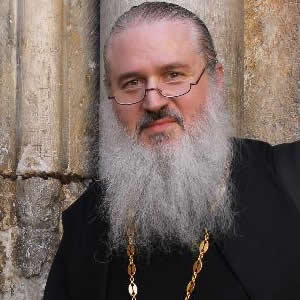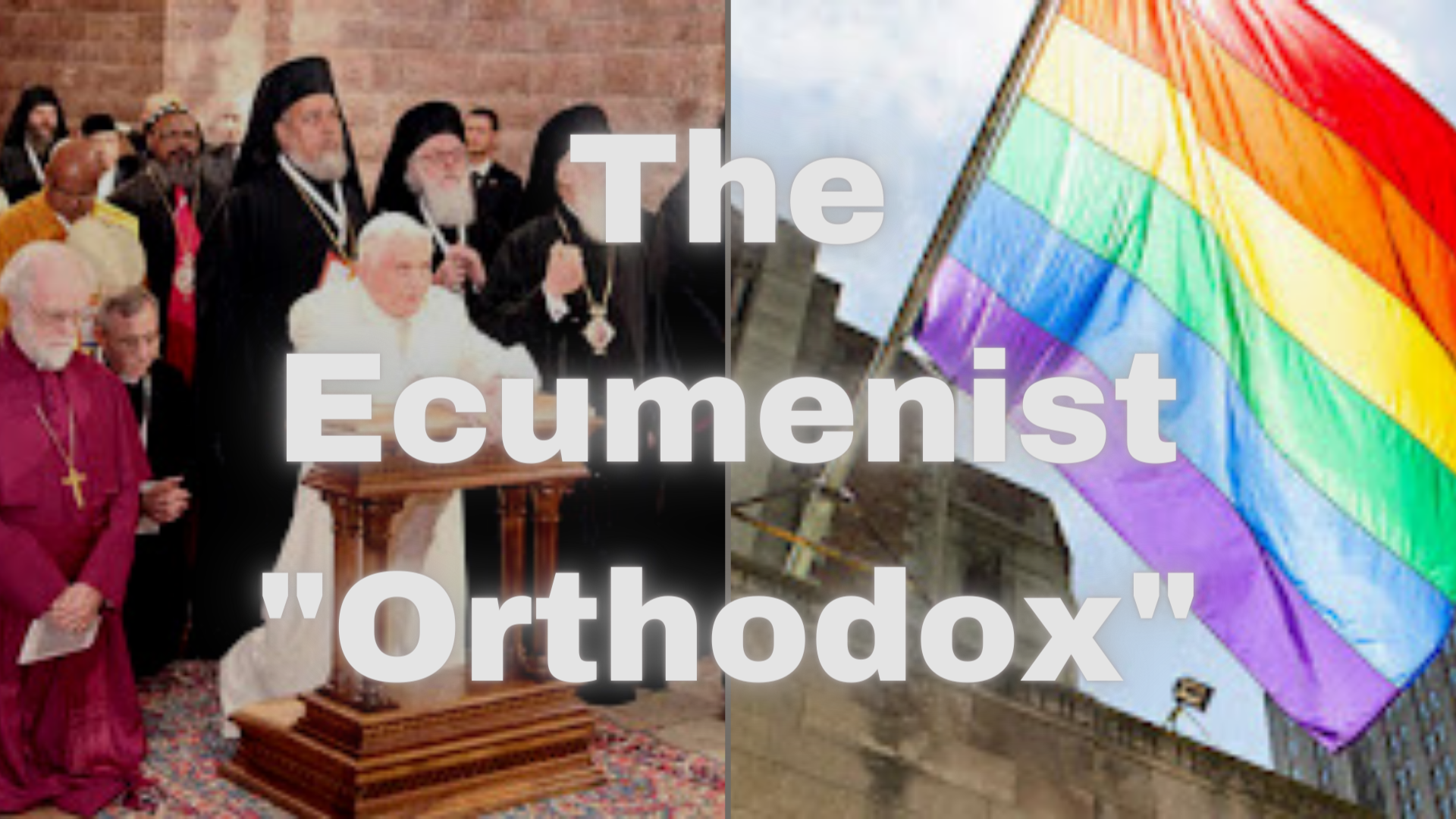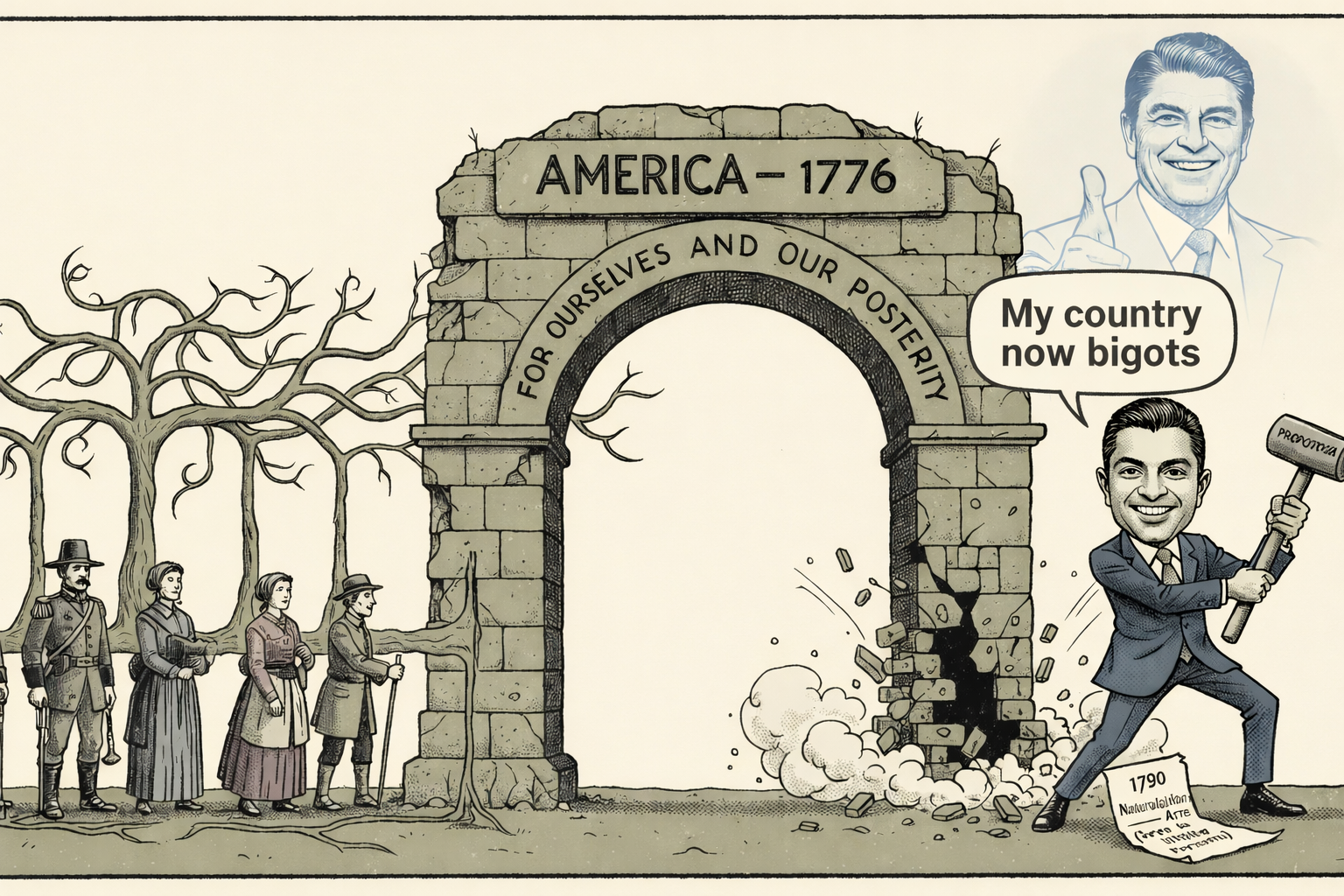The Birth of a New Religion, Part 4
For Part 1 see: The Pro-Abortion “Orthodox” (The Birth of a New Religion, Part 1)
For Part 2 see: The Pro LGBTQP “Orthodox” (The Birth of a New Religion, Part 2)
For Part 3 see: The Renovationist “Orthodox” (The Birth of a New Religion, Part 3)
The use of the word “ecumenical” with reference to the Church has been twisted to mean something entirely different than it has meant historically. The word itself literally means “universal,” but in the context of the Church it was used to refer to universal councils of the One, Holy, Catholic, and Apostolic Church. These councils were not convened in order for Orthodox bishops to hobnob with heretics, or to sweep their differences under the rug. Quite the contrary, these councils were convened in order to drive heresies and unrepentant heretics out of the Church.
The term “Ecumenical” was, however, hijacked by the Ecumenical Movement, which had its origins among Protestants. During the 19th century, Protestant missionary activity around the world expanded exponentially, but since Protestants have wildly different beliefs, the problem of different Protestant sects competing for the same converts on the mission field quickly became apparent. The desire to not have Protestant missionaries working at cross purposes resulted in the first World Missionary Conference, which was held in Edinburgh, Scotland in 1910. This also happened at a time when Protestant liberalism was on the rise, which undermined the doctrinal certainty the various Protestant sects had previously maintained with regard to their own beliefs. So out of the Protestant missionary movement, the Ecumenical movement began to gain steam. The Ecumenical movement had as its goal the unity of all Christians — which would not be a bad goal at all, if the end goal was a unity in the Truth, but as liberal Protestants began abandoning any belief that there was such a thing as Truth, this movement was no longer burdened by conflicting beliefs about what is true, and instead was focused on unity for unity’s sake. The Ecumenical Movement has indeed gone far beyond seeking the unity of all Christians, to seeking the unity of all religions.
Orthodox involvement in the Ecumenical movement has a long and complicated history. In short, some have participated in it for the purpose of bearing witness to the Orthodox Faith, or to facilitate cooperation on matters of mutual interest. But other have participated in it because they have bought into the idea that the Church is divided into various branches, with the Orthodox Church being but one of many branches. Such people have bought into this idea for the same reason that liberal Protestants did — they no longer really believe what the Orthodox Church has always taught, and so are no longer burdened by question of Truth.
There is much more that could be said about the Ecumenical Movement, and why its motivations are heretical (and indeed a pan-heresy, because it seeks to incorporate all heresies into the Church), but I will instead refer the reader to the voluminous articles on Ecumenism on the Orthodoxinfo.com website.
I do however want to draw attention to how Ecumenism among those who are ostensibly Orthodox is working to merge renovationism, modernism, and LGBTQP and abortion activism into what will likely come to be the church of the Antichrist. For evidence of this, one need look no further than Archbishop Elpidophoros.
On June 11th, 2021, Archbishop Elpidophoros served the liturgy for the new calendar feast of the Apostle Bartholomew at the Episcopal Church in Manhattan which happens to be dedicated to St. Bartholomew. He served there, not because there were no Orthodox Churches in the area that would allow him to serve the Liturgy that day, but as a show of unity with a church that has homosexual and transgendered bishops and clergy, and which embraces abortion, and accommodates those who deny the deity of Christ and the reality of the Resurrection (e.g. “Bishop” John Shelby Spong). He did this, while gay pride flags flew over the entrance to this church.
On July 15, 2021, Archbishop Elpidophoros gave a speech at the International Religious Freedom Summit, entitled “The Rising Tide of Religious Nationalism,” in which he said:
“When you elevate one religion above all others, it is as if you decide there is only one path leading to the top of the mountain. But the truth is you simply cannot see the myriads of paths that lead to the same destination, because you are surrounded by boulders of prejudice that obscure your view.”
So not only do the Ecumenists no longer believe that the Orthodox Church is the One, Holy, Catholic, and Apostolic Church, as it has always taught and believed, but that Christ is not the only path to salvation, contrary to the words of Christ Himself: “I am the way, the truth, and the life: no man cometh unto the Father, but by me.” (John 14:6).
On top of all this, the Ecumenical Patriarch has long promoted the idea of union with Rome, which is a church that is much further down the path of “inter-religious dialogue” (see this video and this video, for examples. These videos were produced by Greek Old Calendarists, but the footage shown speaks for itself). Rome is also quickly heading down the path of embracing LGBTQP ideology. German bishops are already allowing services to recognize gay marriages, and while Pope Francis may be uncomfortable with how quickly they are moving, he shows no signs of actually wanting to stop them.
The Ecumenical Patriarch has, along with Pope Francis, jointly invited all Christians to participate in the 1700th anniversary of the Council of Nicaea. Among the issues that are to be addressed at this event is the establishment of a common date for the celebration of Pascha (Easter), which is a pre-requisite for the false union that is being promoted. There are good reasons to believe that this is when they will seal some sort of union.
What has been going on in Ukraine (long before 2022) illustrates how these various heresies are converging together. Let me quote what I said in a talk I gave in Moscow in February of 2019 about the actions of the Ecumenical Patriarch in Ukraine, and where things seem to be heading:
“In the United States and in the English-speaking Orthodox world generally, we hear many voices from within the Patriarchate of Constantinople, which are supporting homosexuality, openly. The Archons have helped fund an Orthodox institute at Fordham University. The heads of this institute have used this platform to launch a website called “Public Orthodoxy” which regularly promotes homosexuality and other forms of deviancy. And it is not bad enough that they publish this material in English, but they now translate their articles into Russian, Greek, and Serbian. And they do this without the slightest hint of any rebuke from the Greek Archdiocese of America. In fact, whenever they have a big event, Archbishop Demetrios of New York is usually present, adding his authority to that event. For example, one of the heads of this institute, Aristotle Papanikolaou, in an article in another pro-homosexual journal, The Wheel, wrote that expecting people who suffer from same-sex attraction to remain celibate is “unrealistic” and unhealthy, and that such desires should best be expressed in the context of “long-term committed relationships or marriages” (The Wheel 13/14, Spring/Summer 2018, p. 97 [emphasis added]. See also “Unitarian Morality With a Little “Theosis” Sprinkled on Top,” “The Living Church 2.0,” and “Cultural Marxism and Public Orthodoxy“).
Patriarch Bartholomew’s Archdeacon, Fr. John Chryssavgis, has made a number of pro-homosexual statements. For example, he wrote a review of a book that was a simple piece of pro-homosexual propaganda written by a homosexual Episcopal priest, and he gushed with praise for what a great contribution this book was to the important “dialogue” on homosexuality. The only slight criticism he made of this book was to say that he remained “unconvinced” by some of the book’s arguments that the Scriptures support homosexuality. This is from a man who has no difficulty expressing his disagreement, in eloquent and striking terms… when he wishes to.
Many of you are aware of the call that was made to “Metropolitan” Epifany, by a Russian prankster, who pretend to be a western diplomat, and congratulated him on the “autocephaly” of the Church in Ukraine, but expressed his hope that the Epifany would take a different stand on homosexuality than the conservative one taken by the Russian Church. Epifany assured him that he would not take such a conservative stand against homosexuality.
And what I have noticed, in the English-speaking Orthodox world at least, is that those who promote the acceptance of homosexuality in the Orthodox Church have all been consistently lining up behind the EP’s actions in Ukraine.
One other agenda item that I think is clearly behind the EP’s actions in Ukraine is the goal of union with Rome. We already see the schismatics in Ukraine concelebrating with Uniates with increasing frequency. One thing that is certain is that Patriarch Bartholomew’s actions in Ukraine make no sense, if he intends to remain in the Orthodox Church.
Furthermore, there are very strong indications that the United States State Department has had some role in pushing for these actions, but to what extent, or in what form this pressure was applied, we do not yet know” (An American Perspective on the Ukraine Crisis).
Along the same lines, I would refer the reader to “The War in Ukraine as a Tool for Progressive Revolution Against Orthodoxy.”
We can of course hope that the Ecumenical Patriarchate will reverse course, and that things will not unfold as I am suggesting, but this will be a lot more likely to happen if more people are aware of where they have been heading, and begin to call these erring “Orthodox” back to the fold.
You cannot be pro-abortion, and be an Orthodox Christian. You cannot advocate LGBTQP ideology and be an Orthodox Christian. You cannot be a renovationist and be an Orthodox Church. You cannot embrace Ecumenism, and deny what the Orthodox Church has always taught about itself, and be an Orthodox Christian. Such people may be formally members of the Church, but they have spiritually cut themselves off from both Christ and the Church. Those who actually are Orthodox need to speak clearly on these issues, so that those want to remain Orthodox Christians, or who want to become Orthodox Christians, will not be confused by their errors.
This is the fourth and final part of a series by Fr. John Whiteford, reposted with his permission.

Fr. John Whiteford is the pastor of St. Jonah Orthodox Church (ROCOR) in Spring, Texas. He is the author of Sola Scriptura: An Orthodox Analysis of the Cornerstone of Reformation Theology, published by Conciliar Press, and the general editor of the St. Innocent Liturgical Calendar.





